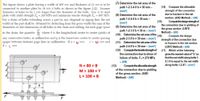
Structural Analysis
6th Edition
ISBN: 9781337630931
Author: KASSIMALI, Aslam.
Publisher: Cengage,
expand_more
expand_more
format_list_bulleted
Concept explainers
Question
Please answer nos. 10, 11 and 12
N=82
M=132
L=102

Transcribed Image Text:(7) Determine the net area of the
path 1-2-3-4 if b = 30 mm -
(mm²)
(8) Determine the net area of the
path 1-2-4 if b = 30 mm –
(mm?)
(9) Determine the net area of the
path 1-2-3 if b = 30 m - (mm?)
(10) Determine the net area of the
path 2-3 if b = 30 mm - (mm²)
(11) Determine the net area of the
path 2-4 if b = 30 mm - (mm²)
(12) Compute the tensilestrength of (17) Which of the following
The figure shows a plate having a width of 400 mm and thickness of
connected to another plate by 34 mm o bolts as shown in the figure 2.22. Assume
diameter of holes to be 2 mm larger than the diameter of the bolts. Use A 36 steel
plate with yield strength F, = 248 MPa and minimum tensile strength F, = 400 MPa.
mm is to be
(14) Compute the allowable
strength of the connection
due to fracture in the net
section. (ASD Method) – (kN)
(15)
For a chain of holes extending across a part in any diagonal or zigzag line, the net
width of the part shall be obtained by deducting from the gross width the sum of the
diameters or slot dimensions of all holes in the chain and adding, for each gage space
Compute the design strength of
the connection due to yielding of
the gross section. (LRFD
Method) – (kN)
(16)
in the chain, the quantity , where S is the longitudinal center to center (pitch) of
Compute the design
strength of the connection due
to fracture in the net section.
any consecutive holes, in millimeters and g is the transverse center to center spacing
(gage) between fastener gage lines in millimeters. If a
L mm.
mm,
c = M mm and
d =
(LRFD Method) – (kN)
the connection due to shear of
failure of bolts. Fy = 270 MPa
gives the nearest value of "b" so
that the net width along bolts 1-
2-3-4 is equal to the net width
along bolts 1-2-4?- (mm²)
- (kN)
(13)
N = 80 + B
M = 100 + Y
Computethe allowable strength
of the connection due to yielding
of the gross section. (ASD
Method) – (kN)
L= 100 + B
la
b
P
NE ---
Expert Solution
This question has been solved!
Explore an expertly crafted, step-by-step solution for a thorough understanding of key concepts.
Step by stepSolved in 2 steps with 2 images

Knowledge Booster
Learn more about
Need a deep-dive on the concept behind this application? Look no further. Learn more about this topic, civil-engineering and related others by exploring similar questions and additional content below.Similar questions
arrow_back_ios
arrow_forward_ios
Recommended textbooks for you

 Structural Analysis (10th Edition)Civil EngineeringISBN:9780134610672Author:Russell C. HibbelerPublisher:PEARSON
Structural Analysis (10th Edition)Civil EngineeringISBN:9780134610672Author:Russell C. HibbelerPublisher:PEARSON Principles of Foundation Engineering (MindTap Cou...Civil EngineeringISBN:9781337705028Author:Braja M. Das, Nagaratnam SivakuganPublisher:Cengage Learning
Principles of Foundation Engineering (MindTap Cou...Civil EngineeringISBN:9781337705028Author:Braja M. Das, Nagaratnam SivakuganPublisher:Cengage Learning Fundamentals of Structural AnalysisCivil EngineeringISBN:9780073398006Author:Kenneth M. Leet Emeritus, Chia-Ming Uang, Joel LanningPublisher:McGraw-Hill Education
Fundamentals of Structural AnalysisCivil EngineeringISBN:9780073398006Author:Kenneth M. Leet Emeritus, Chia-Ming Uang, Joel LanningPublisher:McGraw-Hill Education
 Traffic and Highway EngineeringCivil EngineeringISBN:9781305156241Author:Garber, Nicholas J.Publisher:Cengage Learning
Traffic and Highway EngineeringCivil EngineeringISBN:9781305156241Author:Garber, Nicholas J.Publisher:Cengage Learning


Structural Analysis (10th Edition)
Civil Engineering
ISBN:9780134610672
Author:Russell C. Hibbeler
Publisher:PEARSON

Principles of Foundation Engineering (MindTap Cou...
Civil Engineering
ISBN:9781337705028
Author:Braja M. Das, Nagaratnam Sivakugan
Publisher:Cengage Learning

Fundamentals of Structural Analysis
Civil Engineering
ISBN:9780073398006
Author:Kenneth M. Leet Emeritus, Chia-Ming Uang, Joel Lanning
Publisher:McGraw-Hill Education


Traffic and Highway Engineering
Civil Engineering
ISBN:9781305156241
Author:Garber, Nicholas J.
Publisher:Cengage Learning